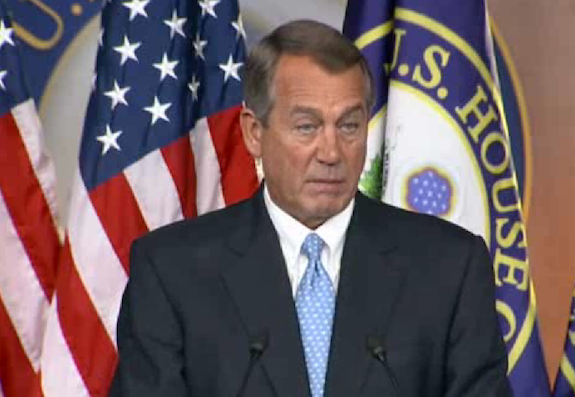WASHINGTON (AP) — White House-backed immigration legislation gained momentum in the Senate on Thursday as lawmakers closed in on a bipartisan compromise to spend tens of billions of dollars stiffening border security without delaying legalization for millions living in the country unlawfully.
“Once the Senate adopts our amendment, I will be proud to vote for a bill that secures our border and respects our heritage as an immigrant nation,” Sen. Mark Kirk, R-Ill., said in a statement. Additional GOP support was expected as a result of the package of changes that some backers dubbed a “border surge” and GOP Sen. Lindsey Graham of South Carolina said “practically militarizes” the U.S. border with Mexico.
Republican Sens. John Hoeven of North Dakota and Bob Corker of Tennessee outlined details of the changes at midafternoon, although they said talks with Democrats on the precise details were not yet complete.
Under the plan, they said the U.S. Border Patrol would double in size with the addition of 20,000 new agents, 700 more miles of fencing would be completed and an additional dozen unarmed surveillance drones would be purchased. The plan also calls for installation of an array of high-tech devices to monitor the U.S. border with Mexico, to include fixed camera towers and mobile surveillance systems.
Under the emerging compromise, the government would grant legal status to immigrants living in the United States illegally at the same time the additional security was being put into place. Green cards, which signify permanent residency status, would be withheld until the security steps were complete.
In addition, immigrants would not be able to claim credit for Social Security taxes they paid while working without lawful status. Credits are used to determine the amount in Social Security benefits a worker receives after retirement.
Officials said the plan envisions doubling the size of the Border Patrol with 20,000 new agents, completing 700 miles of new fencing along the border with Mexico and purchasing new surveillance drones to track would-be illegal border crossers. The cost of the additional agents alone was put at $30 billion over a decade.
Under another change, neither the administration nor states would be permitted to grant welfare benefits for five years to immigrants currently living unlawfully in the United States.
There was no immediate reaction from the White House to terms hashed out by senators in both parties, although Democrats kept administration officials apprised of the talks.
The secretive negotiations continued as the Senate rejected an attempt by one Republican critic to delay legalization until any border security improvements were proven effective rather than merely deployed. Sen. John Cornyn, R-Texas, said his proposal was an attempt “to turn border security rhetoric into reality,” but it was sidetracked on a vote of 54-43.
The agreement began to take shape over the past several days beginning with meetings involving Republicans who were uncommitted on the legislation but receptive to supporting it after changes were made. Eventually, Sen. Chuck Schumer, D-N.Y., and Sen. Bob Menendez, D-N.J., both authors of the bill, joined the talks.
If agreed to, the changes could clear the way for a strong bipartisan vote within a few days to pass the measure that sits atop President Barack Obama’s second-term domestic agenda.
The officials who described the emerging deal spoke on the condition of anonymity because they were not authorized to speak
The developments came as Democrats who met with House Speaker John Boehner on Wednesday quoted him as saying he expected the House to pass its own version of an immigration bill this summer and Congress to have a final compromise by year’s end.
Boehner, R-Ohio, already has said the legislation that goes to the House in the next month or two will not include a pathway to citizenship for immigrants in the United States illegally.
Earlier this week, the Congressional Budget Office jolted lawmakers with an estimate saying that as drafted, the legislation would fail to prevent a steady increase in the future in the number of residents living in the United States illegally.
The estimate appeared to give added credibility to Republicans who have been pressing Democrats to toughen the border security provisions already written into the bill.
“Our whole effort has been to build a bipartisan group that will support the bill,” said Hoeven, who’s helped develop the deal along with Corker. “That’s what this is all about, and it’s focused on border security.”
Schumer and Menendez met at midday Wednesday with Graham, Hoeven, Corker and Sen. John McCain, R-Ariz.
It was unclear which other portions of the Senate legislation might be changed. There is pressure from some Republicans to make sure no federal benefits go to immigrants who are in the country illegally, at least until they become citizens.
The underlying legislation already envisions more border agents, additional fencing along the U.S-Mexico border, surveillance drones, a requirement for employers to verify the legal status of potential workers and a biometric system to track foreigners who enter and leave the United States at air and seaports and by land.
Schumer said discussions with Republicans “have been really productive.”
“We’ve made a lot of progress in the last 24 hours. Now we have some vetting to do with our respective allies,” he said.
Some Republicans have been unwilling to support a bill that grants legal status to immigrants in the country illegally until the government certifies that the border security steps have achieved 90 percent effectiveness in stopping would-be border crossers.
On the other hand, Democrats have opposed Republican proposals to make legalization contingent on success in closing the border to illegal crossings. Under the legislation as drafted, legalization could begin as soon as a security plan was drafted, but a 10-year wait would be required for a green card.

